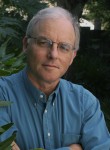The Future Will Belong to the Nature Smart – Part II
Jan 31 2013
 Originally published in the Winter 2013 RSF Quarterly.
Originally published in the Winter 2013 RSF Quarterly.
The hybrid mind
As of 2008, for the first time in history, more than half the world’s population lives in towns and cities. The traditional ways that humans have experienced nature are vanishing along with biodiversity. At the same time, our culture’s faith in technological immersion has no limits.
When my sons were growing up, they spent a lot of time outdoors, but they also played plenty of video games—more than I was comfortable with. Every now and then, Jason and Matthew would try to convince me that their generation was making an evolutionary leap; because they spent so much time texting, video-gaming, and so forth, they were wired differently. In response, I pointed out that my generation had said something similar about drugs, and that didn’t work out so well. Chances are, neither will electronic addiction, which is why the nature balance is so necessary. What’s different now is not the presence of technology, but the pace of the change—the rapidity of the introduction of new media and adoption of new electronic devices.
That nearly total immersion may be clouding our senses and our ability to make sense of the world. Scientists who study human perception no longer assume we have only five senses: taste, touch, smell, sight, and hearing. The number now ranges from a conservative 10 to as many as 30, including blood-sugar levels, empty stomach, thirst, and proprioception (awareness of our body’s position in space). As we spend more and more time in front of screens, we expend increased energy blocking out senses not required for visual learning. What are we not learning? What are we losing?
Gary Small, a neuroscientist at the University of California – Los Angeles, suggests that the pace of technological change is creating what he calls a “brain gap” between the generations. “Perhaps not since early man first discovered how to use a tool has the human brain been affected so quickly and so dramatically,” he writes in his book, iBrain: Surviving the Technological Alteration of the Modern Mind.
If Small is right, then my response to my sons—that evolution doesn’t work that fast—may be overstated.
One view is that people who experience too much technology in the formative years will stunt the maturation of normal frontal lobe development, “ultimately freezing them in teen brain mode,” as the Canadian magazine Macleans puts it. “Are we developing a generation with underdeveloped frontal lobes, unable to learn, remember, feel, control impulses?” Small writes, “Or will they develop new advanced skills that poise them for extraordinary experiences?”
Optimistic researchers suggest that all this multitasking and texting is creating the smartest generation ever, freed from the limitations of geography, weather, and distance—all those pesky inconveniences of the physical world. But Mark Bauerlein, an English professor at Emory University, in his book, The Dumbest Generation, reels out studies comparing this generation of students with prior generations, finding that “they don’t know any more history or civics, economics or science, literature or current events,” despite all that available information.
Here is a third possibility, the emergence of what I call the hybrid mind.
The ultimate multitasking will be to live simultaneously in both the digital and physical world, using computers to maximize our powers to process intellectual data and natural environments to ignite all of our senses and accelerate our ability to learn and to feel; in this way, we could combine the “primitive” powers of our ancestors with the digital speed of our teenagers. Evolution may (or may not) be out of our hands, but as individuals we can accept and celebrate our technological skills at the same time that we seek the gifts of nature essential for the realization of our full intellectual and spiritual potential.
The best preparation for the twenty-first century, therefore, may be a combination of natural and virtual experience. An instructor who trains young people to become the pilots of cruise ships describes “two kinds of students, those who are good at video games, who are terrific with the electronic steering; and those who grew up outside—they’re far better at having a special sense of where the ship is. We tend to get one or the other kind.” The first kind of student, he says, has a talent he prizes. “We have a lot of electronics on the ship.” The second kind of student has another talent he needs. That student, using a wider range of senses, “actually knows where the ship is.” The ideal pilot, he says, is the person who has a balance of high-tech and natural knowledge: “We need people who have both ways of knowing the world.” In other words, a hybrid mind.
Achieving that state of balance will be a worthy goal for business and social entrepreneurs, for educators and physicians, architects and urban planners, for parents and policy-makers. In “The Nature Principle,” I make the case that the future will belong to the nature-smart—those individuals, employers, and political leaders who develop a deeper understanding of nature and balance the virtual with the real.
The more high-tech we become, the more nature we will need.
Richard Louv is the author of eight books, including Last Child in the Woods: Saving Our Children From Nature-Deficit Disorder and The Nature Principle: Reconnecting with Life in a Virtual Age (from which this essay was adapted). He is the recipient of the 2008 Audubon Medal. Past recipients have included Rachel Carson, E.O. Wilson and Jimmy Carter.
Richard is also Chairman Emeritus and co-founder of the Children & Nature Network (C&NN), a leading movement to connect all children, their families and communities to nature through innovative ideas, evidence-based resources and tools, broad-based collaboration and support of grassroots leadership. Learn more about C&NN at www.childrenandnature.org and more about his books at www.richardlouv.com